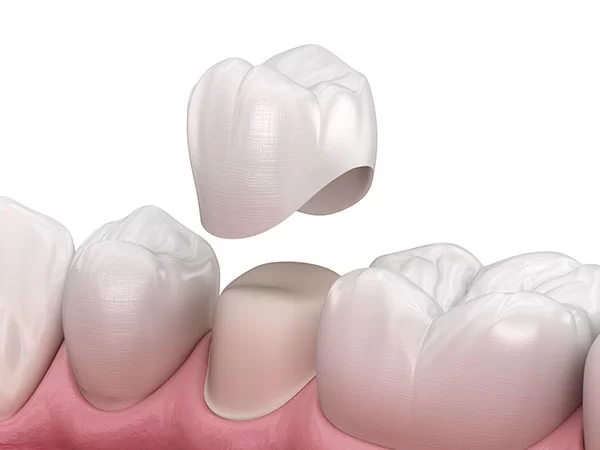Achieve a Stunning Smile with Dental Crowns
Dental crowns are an excellent solution for restoring damaged or decayed teeth, helping numerous patients attain beautiful, healthy smiles. Available in various materials, these crowns are custom-designed to suit each patient’s specific needs.
At our Wilmington and Seaford, DE, dental clinics, our skilled cosmetic dentists provide dental crowns tailored to your oral health requirements. To learn more about dental crowns and determine if they are the right choice for enhancing your smile, contact our Wilmington dental office at (302) 999-7600 or our Seaford dental office at (302) 536-7589! We welcome patients in Wilmington, Seaford, and the surrounding Delaware areas for quality dental care near them.
What Are Dental Crowns?
Dental crowns, commonly referred to as caps or tooth crowns, are prosthetic devices designed to cover damaged or decayed teeth, restoring their function, shape, and appearance. These crowns are custom-crafted to fit over the entire tooth, extending from the gum line to the chewing surface, and can be made from porcelain, ceramic, metal, or a combination of these materials.
A dental crown may also be placed over a dental implant, used to support a dental bridge, or serve as a cosmetic enhancement to improve the look of teeth.
When Is a Dental Crown Necessary?
Dental crowns can address a variety of dental issues. Our dentists in Wilmington and Seaford may suggest a dental crown for several reasons, such as:
- Protecting a Weak Tooth: If a tooth is compromised due to decay, a large dental filling, or a root canal, a dental crown can offer extra support and help prevent the tooth from fracturing.
- Restoring a Broken or Damaged Tooth: A dental crown can restore a tooth that has been broken, cracked, or significantly worn down.
- Covering a Dental Implant: After placing a dental implant, a crown is often used to cover it, providing a natural-looking tooth replacement.
- Supporting a Dental Bridge: Crowns can support a dental bridge, helping to replace missing teeth.
- Enhancing the Appearance of a Tooth: Dental crowns can serve as a cosmetic solution to improve the look of teeth that are misshapen, discolored, or poorly spaced.
Why Choose Us for Dental Crowns?
At Brown and Baran Family Dentistry, our dental crown expertise sets us apart in Delaware. Dr. Paul Brown and Dr. Chris Baran utilize premium materials and digital precision to create crowns that perfectly match your natural teeth in both form and function. Our advanced technology at both Wilmington and Seaford locations ensures precise fits that minimize adjustments and maximize comfort.
With our meticulous attention to detail, efficient appointments, and commitment to long-lasting results, patients throughout Delaware trust us for dental crowns that restore not just their teeth, but their confidence. Experience the difference of crowns crafted with exceptional skill and delivered with genuine care.
Signs You Need Dental Crowns
Some signs that you may need a dental crown in Wilmington and Seaford include:
- Tooth pain or sensitivity
- A cracked or chipped tooth
- A large filling that needs to be replaced
- A tooth that has had a root canal
- A tooth that’s misshapen or discolored
Benefits of Dental Crowns Near You
Some of the benefits of dental crowns in Wilmington and Seaford include:
- Protection: They safeguard weak or damaged teeth from further harm or decay.
- Restoration: Dental crowns restore both the functionality and appearance of compromised teeth.
- Durability: Known for their strength and resilience, dental crowns can last for many years with proper care.
- Versatility: They’re a versatile solution for a range of dental issues, from repairing a broken tooth to covering a dental implant.
- Aesthetics: Dental crowns can be tailored to match the color and shape of your natural teeth, resulting in a seamless and visually appealing outcome.
If you’re curious about how dental crowns might benefit you, contact our Wilmington dental office at (302) 999-7600 or our Seaford dental office at (302) 536-7589 today to book your appointment!
Types of Dental Crowns
There are several types of dental crowns available, ensuring that each patient receives the most suitable option for restoring their smile. Our dentists in Wilmington and Seaford will assess your needs and suggest the ideal choice for your dental health.
Porcelain Crowns
Porcelain crowns are crafted from a tooth-colored material that can be precisely matched to the shade of your natural teeth, making them an ideal choice for front teeth. These crowns are biocompatible and provide a natural, lifelike appearance.
Metal Crowns
Metal crowns are crafted from materials such as gold, nickel, or other metal alloys. They are incredibly robust, capable of withstanding significant biting forces, and are known for their long-lasting durability. However, their metallic hue makes them less desirable for use on front teeth.
Porcelain-fused-to-Metal Crowns (PFM)
PFM crowns combine a metal base with a porcelain exterior, offering the durability of metal and the aesthetic appeal of porcelain. They are suitable for both front and back teeth.
Zirconia Crowns
Zirconia crowns are constructed from a strong, biocompatible material that resists chipping and cracking. These crowns can be color-matched to your natural teeth, making them an excellent choice for back teeth.
Same-Day Crowns
Same-day crowns, also known as CEREC crowns, are a type of dental crown that can be created and fitted in just one dental visit. This differs from traditional dental crowns, which generally necessitate multiple appointments and the use of temporary crowns while waiting for the permanent crown to be made in a dental lab. We may provide this option for our patients, depending on their needs. Contact our Wilmington dental office at (302) 999-7600 or our Seaford dental office at (302) 536-7589 today to book your appointment.
The Dental Crown Procedure at Our Wilmington and Seaford Dental Offices
Consultation and Planning
The dental crown process typically begins with a thorough examination and diagnosis. At our Wilmington and Seaford offices, Drs. Paul Brown and Christopher Baran will assess the condition of your tooth, checking for issues such as decay, fractures, or other problems.
X-rays may be taken to evaluate the roots, the surrounding bone, and the extent of the damage to determine if a crown is necessary or if dental crown alternatives may be better suited.
First Visit: Tooth Preparation
During your first visit, our dentists will begin by numbing the tooth and surrounding gum tissue using a local anesthetic to ensure your comfort. The tooth is then reshaped along the chewing surface and sides to make room for the crown. The amount of tooth structure removed depends on the type of crown chosen and the extent of the damage to the tooth.
Impressions and Temporary Crown
Once the tooth is reshaped, we will take impressions of the prepared tooth and the surrounding teeth. These impressions are critical to creating a custom crown that fits perfectly and aligns with your bite. Impressions may be taken using traditional molds or with advanced digital intraoral scanners. A temporary crown, typically made of acrylic, will be placed to protect the tooth while your permanent crown is being created.
Permanent Crown Creation Options
At our Wilmington and Seaford offices, we offer same-day dental crown services, depending on your preferences and oral health needs. We can either create your crown with an in-office milling machine or send the impressions to a dental lab for custom fabrication. If we opt for a lab-made crown, your permanent crown will be ready for placement during your second visit.
Second Visit: Permanent Crown Fitting
Once the permanent crown is ready, your dentist will remove the temporary crown. The new crown will be placed to check its fit, color, and bite alignment. If everything looks perfect, the crown is permanently cemented in place after the tooth is thoroughly cleaned. The dentist may make minor bite adjustments, asking you to bite down several times to verify comfort and proper alignment.
Aftercare and Follow-up
After your crown procedure, it’s normal to experience some sensitivity or mild discomfort as the anesthesia wears off. Over-the-counter pain relievers can help ease any discomfort. Proper dental crown aftercare is essential to ensuring the longevity of your new crown.
We recommend brushing and flossing regularly, as well as attending routine dental check-ups. Additionally, avoid hard foods and refrain from using the crowned tooth to open packages or as a tool, as this can help prolong its lifespan.

Frequently Asked Questions
With proper care, dental crowns from Brown and Baran Family Dentistry typically last 10-15 years or longer. Several factors influence crown longevity for Delaware patients:
- Oral Hygiene Practices: Regular brushing, flossing, and professional cleanings at our Wilmington or Seaford offices
- Diet and Habits: Avoiding extremely hard foods and not using teeth as tools
- Bruxism Management: Using custom nightguards for teeth grinding, which is common among Delaware residents with high-stress jobs
- Regular Dental Checkups: Allowing early detection of potential issues before they compromise your crown
- Material Chosen: Some materials (like gold and zirconia) tend to be more durable than others
Delaware’s varying seasonal humidity and temperature changes don’t significantly impact modern crown materials, but proper maintenance is essential regardless of the season.
As Delaware’s comprehensive dental care providers, we offer multiple restoration options and can help you understand the differences:
Dental Crowns vs. Fillings:
- Crowns cover the entire tooth, providing complete protection
- Fillings treat smaller areas of decay but don’t strengthen the entire tooth
- Crowns are recommended when decay or damage affects more than 50% of the tooth
Crowns vs. Veneers:
- Crowns cover the entire tooth, veneers cover only the front surface
- Crowns require more tooth reduction but provide more structural support
- Veneers are primarily cosmetic, while crowns are both functional and aesthetic
Crowns vs. Dental Implants:
- Crowns preserve your natural tooth root, implants replace the entire tooth
- Crowns are less invasive and less expensive initially
- Implants may be necessary if the tooth cannot be saved
Dr. Paul Brown and Dr. Chris Baran will thoroughly evaluate your situation at our Wilmington or Seaford location and recommend the most appropriate option for your specific needs.
At our Delaware dental offices, we offer advanced CEREC technology for qualifying patients who need dental crowns:
- Single-Visit Convenience: Complete your crown in just one appointment (approximately 2 hours)
- Digital Precision: Advanced 3D scanning eliminates the need for messy traditional impressions
- No Temporary Crowns: Avoid the inconvenience of wearing a temporary crown for weeks
- Custom Design: Dr. Brown and Dr. Baran personally design your crown using specialized computer software
- In-Office Milling: Watch as our precision milling unit crafts your crown from a solid ceramic block
- Immediate Placement: Your permanent crown is bonded in place the same day
CEREC crowns are especially popular among busy Delaware professionals, parents, and those who live far from our offices, as they minimize time away from work and family. This technology is available at both our Wilmington and Seaford locations, though not all cases are suitable for same-day treatment. During your consultation, we’ll determine if CEREC is right for your specific situation.
Determine if Dental Crowns Are Suitable for You
Dental crowns offer a reliable solution for restoring teeth that are damaged or decayed. To find out if this treatment is right for you, contact our Wilmington office at (302) 999-7600 or our Seaford office at (302) 536-7589 to book a consultation with our dentists.
They will assess your oral health and suggest the most appropriate treatment plan. We’re delighted to welcome new and returning patients from Delaware and nearby regions.



